Grâce à Léo Dechamboux et Fred Vionnet, le livre « Le mental du grimpeur » propose une synthèse exhaustive des différents outils de préparation mentale à mettre en place en escalade. Après une préface de Nico Pelorson mettant en exergue le fait que les aspects mentaux, pourtant très importants, sont souvent minimisés et peu travaillés par rapport aux aspects physiques, l’ouvrage se décompose en 3 parties. Une première partie, assez théorique, décrit les stratégies de préparation mentale en différentes habiletés mentales, à utiliser en fonction des situations, de manière à optimiser sa performance : la fixation d’objectifs, la gestion de sa motivation, de son attention, … Une seconde partie, assez générale, décline l’entrainement mental au quotidien, en terme de planification annuelle pour se fixer des objectifs, de développement de sa confiance en soi, de gestion de sa zone de confort ; les auteurs y définissent des axes de travail par rapport à ses points faibles ou encore ponctuellement pour se préparer à une échéance. Une dernière partie, très concrète, met en lumière tous les dispositifs qui s’offrent au grimpeur afin d’optimiser sa performance pendant sa séance, à travers des stratégies de mémorisation, de préparation à l’effort, la mise en place de routines, la gestion des peurs, de la concentration, de la combativité,… Enfin, la gestion des émotions, l’importance de la dynamique de groupe et de l’esprit de cordée, l’analyse et le bilan de séance sont aussi étudiés. Très pédagogique et utile pour tout pratiquant (grimpeur, coach, parent), « Le mental du grimpeur » propose un bel effort de vulgarisation sur un des thèmes clés de l’entrainement en escalade. Grâce à une architecture claire, des témoignages de top grimpeurs, des exemples imagés, de nombreux tableaux et encadrés explicatifs et des situations clé en main très concrètes, ce livre sera utile afin de faire le point sur les incontournables de la préparation mentale, afin de sensibiliser sur ces aspects souvent éludés.
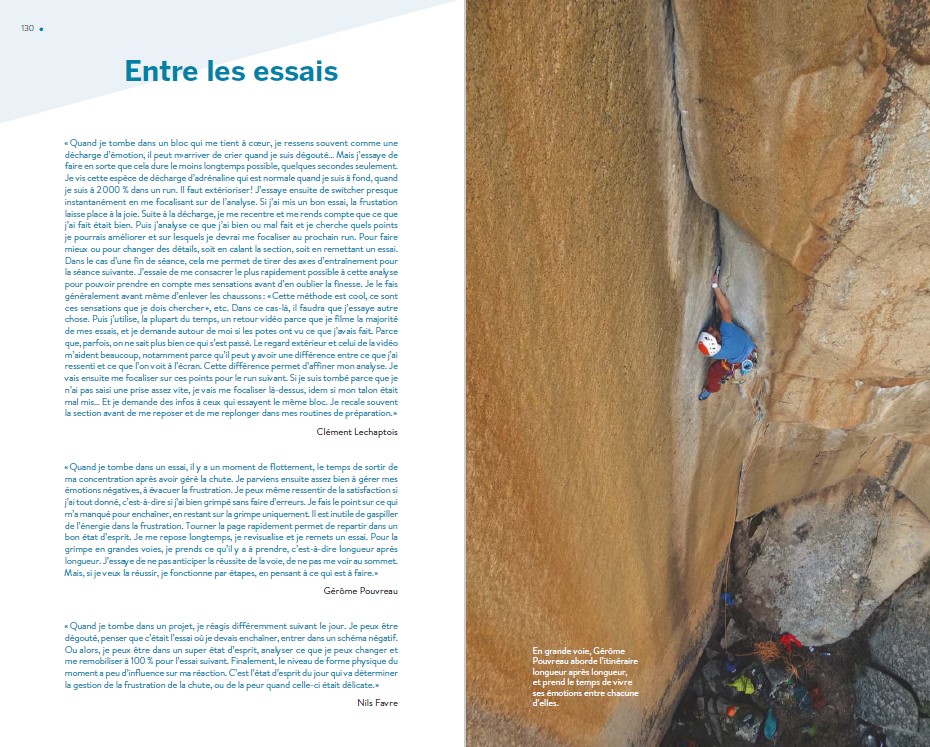
Quelques mots échangés avec Léo Dechamboux, co-auteur de l’ouvrage.
– Peux-tu te présenter ?
Côté perso, je suis un grimpeur, j’aime surtout me retrouver dehors, dans des endroits qui comptent, avec des amis, et partager des moments autour de cette activité qui m’accompagne depuis pas mal d’ années maintenant. À côté de ça, j’ai évidemment des projets qui me tiennent à cœur, accompagnés de toutes les joies et les frustrations que ça peut occasionner. Pour parler de ma formation, j’ai suivi un parcours un peu classique : celui du lycéen qui fait de la compétition et qui n’a pas de supers résultats scolaires, à qui ce format ne correspond pas beaucoup et qui file en STAPS à Grenoble pour continuer de grimper le plus possible, et qui a du mal à se projeter à long terme. Sauf qu’une fois arrivé à Grenoble, l’autonomie et la diversité des cours que j’ai pu suivre m’ont beaucoup plu et l’entraînement (entre autres) est vraiment devenu quelque chose d’attrayant pour moi. Je voulais tout comprendre et pensais pouvoir rationaliser un paquet de paramètres de la performance. J’ai donc terminé ma licence entraînement, puis j’ai passé le DEJEPS perfectionnement sportif (une des premières sessions il me semble), avant de reprendre la fac à Montpellier avec un master en préparation mentale (accessible avec une licence entraînement ou une licence de psycho). En sortant de ce master, je ne savais toujours pas trop où je voulais bosser, ni exactement quoi faire ; même si la préparation mentale semblait être au centre de mes intérêts. Il se trouve que plusieurs opportunités me sont tombées dessus : un poste d’enseignant vacataire à l’UFRAPS de Grenoble pour enseigner la psycho du sport, un poste au club DVE (où j’avais fait mes stages de licence et de DEJEPS) en tant qu’entraîneur, et un poste de préparateur mental au pôle espoir de Voiron qui allait voir le jour. J’ai donc accepté les trois et me suis réinstallé à Grenoble. Depuis deux ans, j’ai arrêté d’entraîner pour me focaliser au maximum sur l’accompagnement psychologique des sportifs, la formation d’entraîneurs et l’écriture.
– Quelles sont tes influences et grandes idées en matière d’entrainement ?
J’ai un parcours très universitaire. Donc mon approche de l’entraînement a d’abord été très rationnelle. Mais quand j’ai commencé à entraîner, même si j’ai toujours gardé ce regard, ce qui me plaisait le plus c’était l’accompagnement des grimpeurs vers leurs objectifs sportifs, mais aussi le côté éducatif. Voir les gens grandir, faire leurs choix, les accompagner et m’adapter à leurs fonctionnements est ce qui m’a le plus porté. Mais je n’ai pas fait d’entraînement assez longtemps et à assez haut niveau pour pouvoir dire que j’ai d’immenses convictions, si ce n’est le besoin d’individualisation et la nécessité de toujours conserver un esprit critique par rapport à des méthodes, notamment celles qui semblent être des recettes miracles. Je serais plus à même de parler de mes influences et convictions dans le cadre de la prépa mentale, c’est vraiment ma spécialité aujourd’hui, et je ne pense pas que je reviendrai un jour à entraîner dans le sens classique du terme ; du moins ce n’est pas en projet.
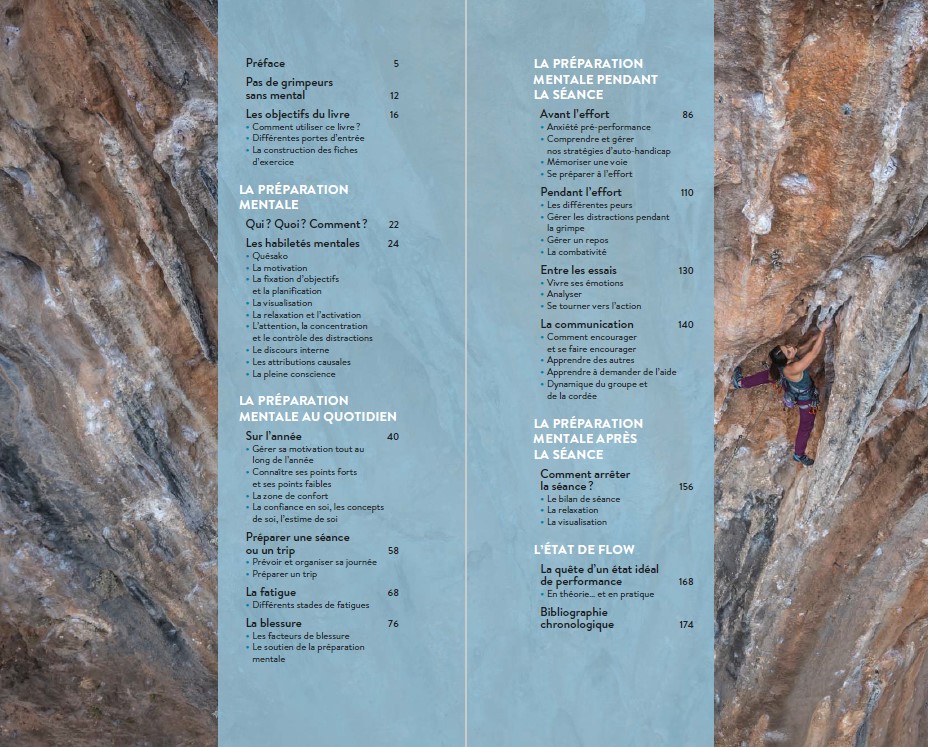
– Pourquoi te focaliser sur l’entrainement mental ?
Quand j’ai passé le DEJEPS, je savais que j’irai à Montpellier pour cette spécialisation “mentale”. Tout simplement parce que tous les cours de psycho, de psycho sociale et de psycho du sport m’ont tout de suite fascinés quand j’étais en licence. C’est une spécialité vraiment riche, qui permet de comprendre ses propres fonctionnements, ceux du groupe, et ceux des athlètes. Et puis il y a un aspect que j’aime particulièrement dans cette approche : c’est le pas de côté par rapport à la performance. Je ne suis pas un énième intervenant à graviter autour du sportif pour l’aider à être plus fort. En tout cas pas seulement. Mon rôle est de proposer un espace de confiance dans lequel le grimpeur (notamment le compétiteur) peut être autre chose qu’un champion. Dans ce cadre, il peut amener des problématiques et des questionnements très variées, comme sa place dans le groupe, son projet professionnel qui n’est pas forcément adapté à la vie de sportif, l’envie d’arrêter l’escalade, ou bien juste des soucis plus personnels. L’idée est d’ouvrir cette porte et d’accompagner au mieux la personne vers des choix qui servent son équilibre global, son autonomie et son bien être psychologique, avant la performance. Bref, je trouve le regard de la préparation mentale très riche humainement, et vraiment nécessaire dans un système où l’élite sportive est très valorisée, parfois au détriment de la santé des plus performants, mais aussi de ceux qui n’accèdent pas au haut-niveau.
– Avec Fred, comment vous est venue l’idée d’écrire un bouquin ?
J’ai toujours aimé écrire, je l’ai fait occasionnellement pour Grimper et EscaladeMag quand j’étais à la fac, pour arrondir les fins de mois. J’ai adoré les travaux de Mémoire en master : prendre un sujet précis, en devenir spécialiste, et transmettre ça à l’écrit dans un format très réglementé. Il y a presque deux ans, j’ai renoué avec un projet qui me tenait à cœur depuis un moment : écrire un grand dossier sur la prépa mentale en escalade. Là encore j’ai adoré comprendre la demande, adapter le fond et la forme, répondre au mieux au cadre et aux codes de Grimper pour proposer un sujet accessible et pointu à la fois… En écrivant ce dossier, je m’étais fait la réflexion selon laquelle un livre m’aurait permis de vraiment approfondir le sujet. J’en ai parlé à quelques proches et j’ai rangé l’idée. Quelques mois après la sortie de ce dossier, Noémie Ponton de Glénat m’appelle. On ne se connaissait pas et elle m’a présenté le projet de ce qui s’appelle aujourd’hui “le mental du grimpeur”. Elle en est à l’origine.. Dans un premier temps elle avait contacté Marc Carrère qui n’est pas spécialiste de l’escalade, et qui avait accepté à condition de pouvoir l’écrire avec Fred, qui lui est entraîneur en escalade. Marc n’a finalement pas pu se lancer dans le projet. Fred a alors parlé de moi à Noémie et c’était parti ! Là, ça fait un an que j’ai reçu le coup de fil, et chaque étape du projet était passionnante ! J’espère vraiment que les grimpeurs et les grimpeuses de tous niveaux qui souhaitent s’intéresser à ce sujet trouveront des réponses et s’empareront de ce qu’on a pu proposer.
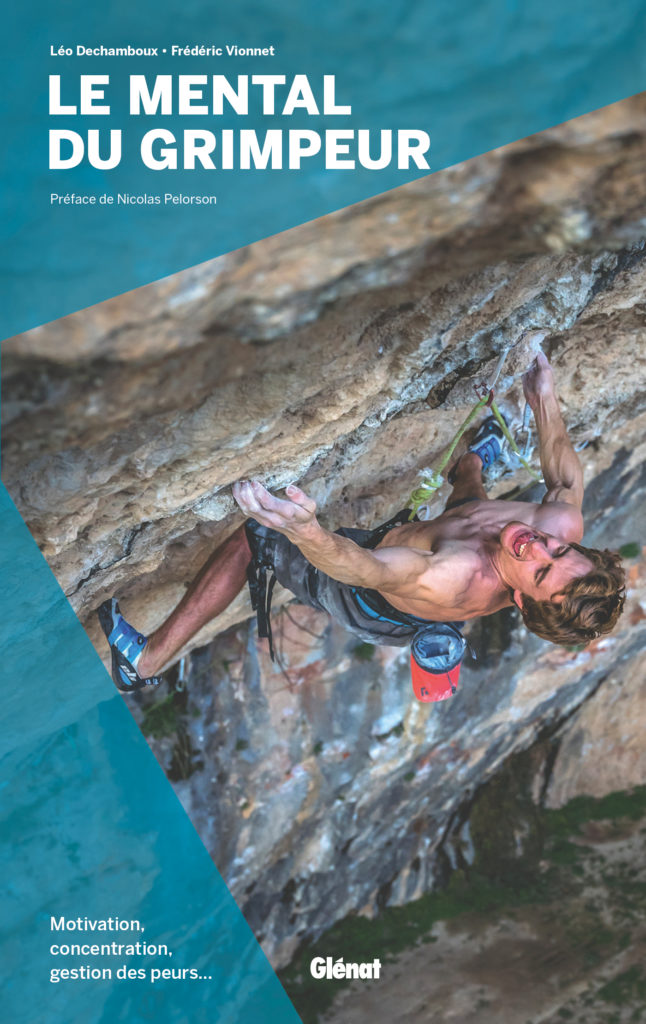
Written by Léo Dechamboux and Fred Vionnet, « Le mental du grimpeur » offers an exhaustive synthesis of the various mental preparation tools used in climbing. After a preface by Nico Pelorson highlighting the fact that the mental aspects, however very important, are often minimized compared to the physical aspects, the book is divided into 3 parts. A first part, quite theoretical describes the strategies of mental preparation in different mental skills, to be used according to the situations in order to optimize its performance: the goals fixing, the management of its motivation, its attention,… A second part quite general, declines mental training on a daily basis, in terms of annual planning to set goals, develop self-confidence, manage your comfort zone and define lines of work in relation to your weak points or even occasionally to prepare for a deadline. A last part, very concrete, highlights all the devices available to the climber in order to optimize his performance during his session, through memorizing strategies, preparation for the effort, the implementation of routines, the management of fears, concentration, fighting spirit, etc. Finally, the management of emotions, the importance of group dynamics, communication, the trust to the belayer, the analysis of the climbing session are also studied. Very educational and useful for all climbers (climbers, coaches, parents), « Le mental du grimpeur » offers a great effort to popularize one of the key themes of climbing training. Thanks to a clear architecture, testifies from top climbers, pictorial examples, numerous tables, examples and very concrete turnkey situations, this book will be useful in order to highlight the essentials of mental preparation, and to be aware about these forgotten aspects.
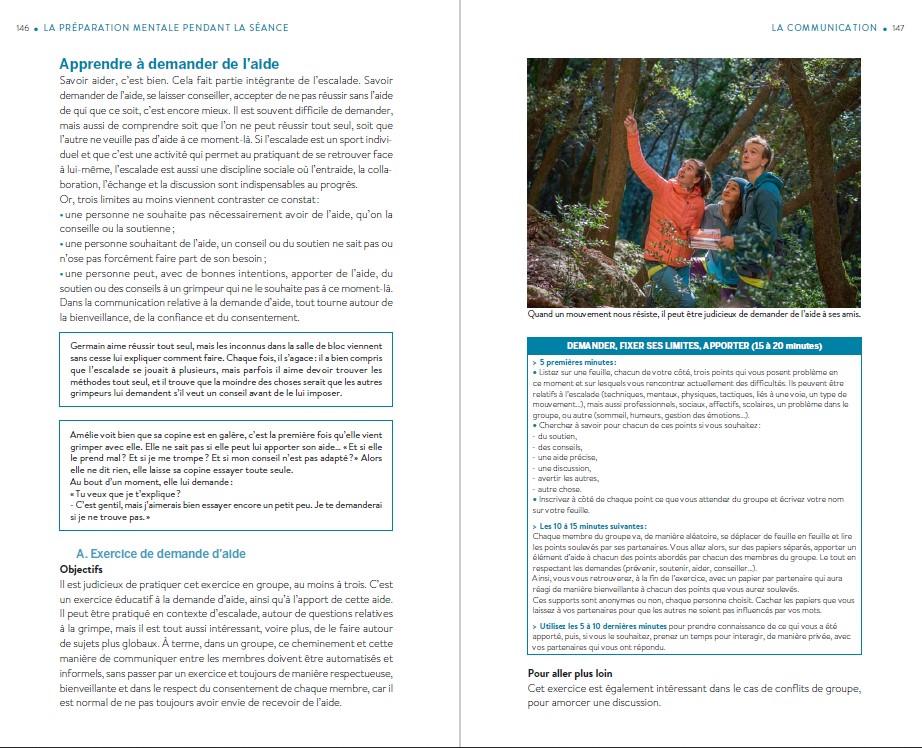
Interview with Léo Dechamboux, co-author of the book
Can you introduce yourself?
I’m a climber, I especially like being outside, in places that matter, with friends, and sharing moments around this activity which has joined me for quite a few years now. Besides that, I obviously have projects that are close to my heart, with all the joys and frustrations that can cause. To talk about my training, I followed a somewhat classic path: that of the high school student who competes and who doesn’t have great academic results, to whom this format doesn’t correspond very much and who goes to Sport university in Grenoble to continue to climb as much as possible, and who has trouble planning for the long term. Except that once I arrived in Grenoble, I really liked the autonomy and the diversity of the lessons I was able to follow and the training (among other things) really became something attractive for me. I wanted to figure it all out and thought I could streamline a bunch of performance aspects. So I finished my diploma, then I passed the DEJEPS (new diploma for being climbing instructor in France, one of the first sessions it seems to me), before going back to university in Montpellier with a master’s degree in mental preparation. Coming out of this master’s, I still didn’t really know where I wanted to work, or exactly what to do; even though mental preparation seemed to be at the center of my interests. It so happened that several opportunities went: a temporary professorship at the Sort university of Grenoble to teach sports psychology, a place as trainer at the climbing association around, and an opportunity as mental coach at the French climbing team center in Voiron. So I accepted all three jobs and moved back to Grenoble. Two years ago, I stopped coaching to focus as much as possible on the psychological support of athletes, the training of coaches and writing.
– What are your influences and big ideas in training?
I have a very academic background. So my approach to training was very rational at first. But when I started to train, even if I always kept this side, what I liked the most was the accompaniment of the climbers towards their sporting goals, but also the educational side. Seeing people grow, making their choices, accompanying them and adapting to their ways of training is the thing which satisfied me the most. But I haven’t trained long an strong enough to be able to say that I have immense convictions, except for the need for individualization and the need to always keep a critical mind to training process, especially those that seem to be miracle recipes. I will be better able to talk about my influences and convictions within the framework of mental preparation, it is really my specialty today, and I don’t think that I will one day return to coaching in the classic sense of the term; at least it’s not planned.
– Why did you turn on mental aspects in climbing?
When I passed the climbing instructor diploma, I knew that I would go to Montpellier for this “mental” specialization. Quite simply because all the psychology, social psychology and sports psychology lessons immediately fascinated me when I was in my bachelor’s degree. It is a really rich specialty, which allows you to understand your own functioning, the one of the group, and the one of the athletes. And then there is an aspect that I particularly like in this approach: it’s the step aside in relation to performance. I’m not yet another voice to gravitate around the athlete to help him be stronger. In any case not only. My role is to offer a space of trust in which the climber (especially the competitor) can be something other than a champion. In this context, he can bring up very varied problems and questions, such as his place in the group, his professional project which is not necessarily adapted to the life of an athlete, the desire to stop climbing, or even just more personal concerns. The idea is to open this door and to best support the person towards choices that serve their overall balance, their autonomy and their psychological well-being, before performance. In short, I find the perspective of mental preparation very rich humanly, and really necessary in a system where the sporting elite is highly valued, sometimes to the detriment of the health, but also of those who do not reach the top -level.
– How went the idea to write a book with Fred?
I always liked to write, I did it occasionally for Grimper Magazin when I was in university. I loved the Master’s thesis work: taking a specific subject, becoming a specialist in it, and transmitting it in writing in a very regulated format. Almost two years ago, I returned to a project that had been close to my heart for a while: to write a large article on mental preparation in climbing. Here again I loved understanding the request, adapting the content and the form, answering as well as possible to the framework and the codes of Grimper Magazine to propose an accessible and deep subject at the same time… When writing this file, I had thought that a book would allowed me to really dig on the subject. I talked to a few relatives about it and I put the idea away. A few months after the publication of this article, Noémie Ponton from Glénat called me. We didn’t know each other and she introduced me to the project of what is now called « Le mental du grimpeur ». She is at the origin of it. At first she had contacted Marc Carrère who isn’t a climbing specialist, and who accepted to write it on condition of being able to write it with Fred, who is a climbing coach. Marc was ultimately unable to start on the project. Fred then spoke to Noémie about me and off we went! There, it’s been a year since I received the phone call, and each step of the project was exciting! I really hope that climbers of all levels who wish to take an interest in this subject and will find answers understand and use what we have been able to offer.



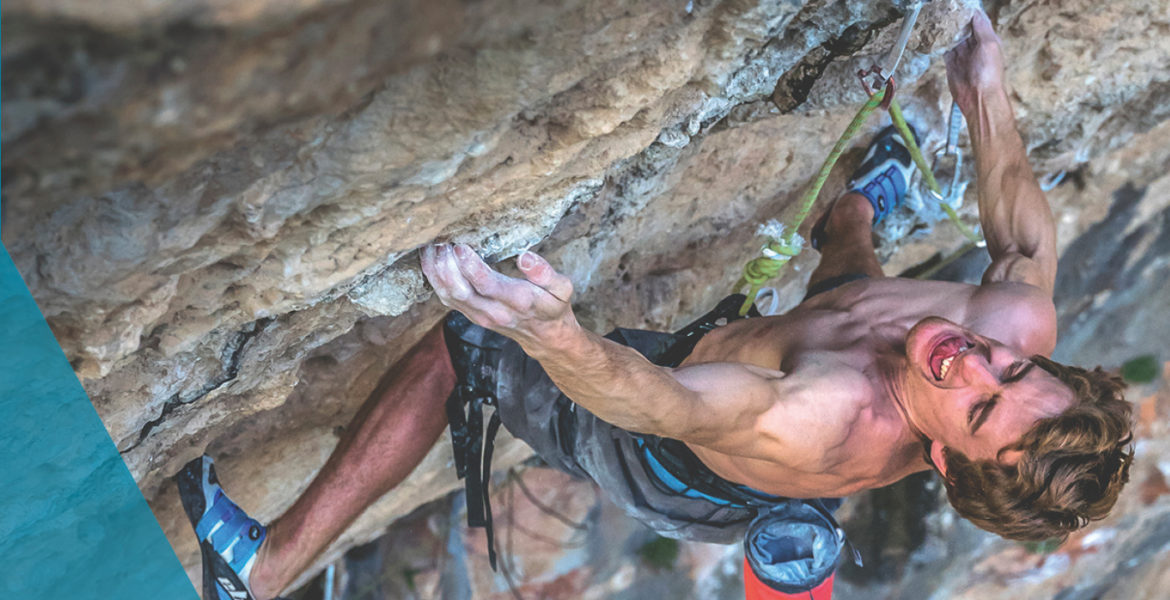
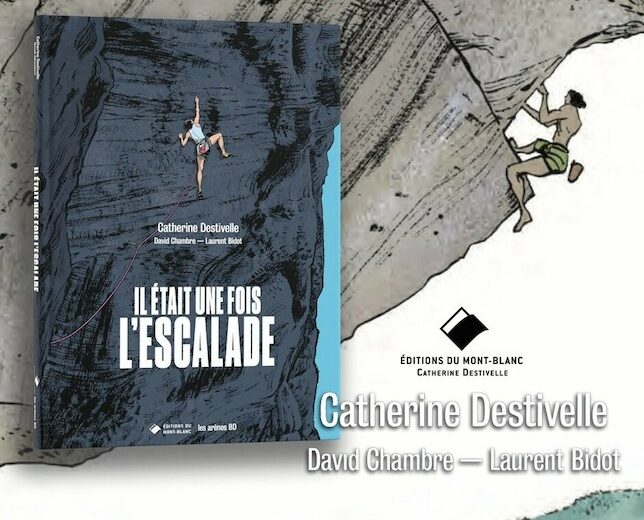
Frédéric Vionnet
Merci de parler ne notre livre. J’espère qu’il aidera beaucoup de grimpeurs et d’entraîneurs.